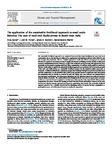The application of the sustainable livelihood approach to small scale-fisheries: The case of mud crab Scylla serrata in South west India
| dc.contributor.author | Apine, E | |
| dc.contributor.author | Turner, Lucy | |
| dc.contributor.author | Rodwell, LD | |
| dc.contributor.author | Bhatta, R | |
| dc.date.accessioned | 2019-05-16T20:15:20Z | |
| dc.date.issued | 2019-03-15 | |
| dc.identifier.issn | 0964-5691 | |
| dc.identifier.issn | 1873-524X | |
| dc.identifier.uri | http://hdl.handle.net/10026.1/14078 | |
| dc.description.abstract |
The sustainable livelihood approach is an analytical framework that helps identifying the assets that local communities rely on, the risks they are subjected to, organisations and institutions influence their daily lives and the strategies they undertake. This is a valuable approach in small-scale fisheries management as artisanal fisheries are exposed to uncertainty in terms of supply and demand, and fishing activities usually are influenced by social and institutional factors. However, in spite of its usefulness and the fact that this approach has been previously used in projects targeting small-scale fisher communities, it is still not widely applied to small-scale fisheries. In this study we applied the sustainable livelihood approach as an analytical tool to assess the potential of the mud crab Scylla serrata as a sustainable livelihood resource for the southwest Indian states such as Karnataka. As fishers worldwide face continuous pressure from industrial fishing fleets and decreased fish stocks and their productivity, we also identified what could be the potential barriers to small-scale mud crab farming for communities that are already are involved in mud crab fishing. Data were collected and analysed from a semi-structured questionnaire, two focus group discussions and key informant interviews conducted in Uttara Kannada district, Karnataka. The results indicated that though mud crab is perceived as a good source of income in this area, at present it is not recognised as a steady source of income due to the unpredictable fishery catches. Respondents were aware of mud crab farming yet stated the lack of land and financial resources as the main barriers and only the minority expressed any interest in undertaking such activity. The sustainable livelihood approach proved to be a valuable research tool for identifying matters of concern for local communities regarding their source of livelihoods and barriers to small-scale aquaculture. | |
| dc.format.extent | 17-28 | |
| dc.language | en | |
| dc.language.iso | en | |
| dc.publisher | Elsevier | |
| dc.subject | Sustainable livelihood approach | |
| dc.subject | Crustacean fisheries | |
| dc.subject | Artisanal fisheries | |
| dc.subject | Fisheries management | |
| dc.subject | Small-scale aquaculture | |
| dc.subject | Vulnerability | |
| dc.title | The application of the sustainable livelihood approach to small scale-fisheries: The case of mud crab Scylla serrata in South west India | |
| dc.type | journal-article | |
| dc.type | Journal Article | |
| plymouth.author-url | http://gateway.webofknowledge.com/gateway/Gateway.cgi?GWVersion=2&SrcApp=PARTNER_APP&SrcAuth=LinksAMR&KeyUT=WOS:000459236000002&DestLinkType=FullRecord&DestApp=ALL_WOS&UsrCustomerID=11bb513d99f797142bcfeffcc58ea008 | |
| plymouth.volume | 170 | |
| plymouth.publication-status | Published | |
| plymouth.journal | Ocean and Coastal Management | |
| dc.identifier.doi | 10.1016/j.ocecoaman.2018.12.024 | |
| plymouth.organisational-group | /Plymouth | |
| plymouth.organisational-group | /Plymouth/Faculty of Science and Engineering | |
| plymouth.organisational-group | /Plymouth/Faculty of Science and Engineering/School of Biological and Marine Sciences | |
| plymouth.organisational-group | /Plymouth/Faculty of Science and Engineering/School of Geography, Earth and Environmental Sciences | |
| plymouth.organisational-group | /Plymouth/REF 2021 Researchers by UoA | |
| plymouth.organisational-group | /Plymouth/REF 2021 Researchers by UoA/UoA07 Earth Systems and Environmental Sciences | |
| plymouth.organisational-group | /Plymouth/REF 2021 Researchers by UoA/UoA14 Geography and Environmental Studies | |
| plymouth.organisational-group | /Plymouth/Research Groups | |
| plymouth.organisational-group | /Plymouth/Research Groups/Marine Institute | |
| plymouth.organisational-group | /Plymouth/Users by role | |
| plymouth.organisational-group | /Plymouth/Users by role/Academics | |
| dcterms.dateAccepted | 2018-12-23 | |
| dc.rights.embargodate | 2020-2-1 | |
| dc.identifier.eissn | 1873-524X | |
| dc.rights.embargoperiod | Not known | |
| rioxxterms.versionofrecord | 10.1016/j.ocecoaman.2018.12.024 | |
| rioxxterms.licenseref.uri | http://www.rioxx.net/licenses/all-rights-reserved | |
| rioxxterms.licenseref.startdate | 2019-03-15 | |
| rioxxterms.type | Journal Article/Review |


